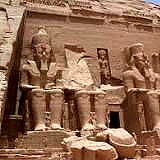
|
Abu Simbel Temples Abu Simbel, Egypt ☎ +20 2 22617304 Last Updated: 08/24/2023 |
| The Abu Simbel Temples are a pair of ancient Egyptian temples located near the southern border of Egypt, close to the town of Abu Simbel. These temples are renowned for their monumental size, impressive architecture, and historical significance. | |
| - Location: The Abu Simbel Temples are located in the Nubia region of southern Egypt, near the banks of Lake Nasser. They are approximately 280 kilometers (174 miles) southwest of Aswan. - Construction: The temples were originally constructed during the reign of Pharaoh Ramesses II in the 13th century BCE. They were built to commemorate his victory at the Battle of Kadesh and to honor the gods Amun-Ra, Ra-Horakhty, Ptah, and Ramesses himself. - Monumental Size: The two main temples at Abu Simbel are the Great Temple of Ramesses II and the Small Temple of Nefertari. The Great Temple is particularly notable for its massive rock-cut façade with four colossal seated statues of Ramesses II, each standing around 20 meters (66 feet) tall. - Relocation: In the 1960s, the temples faced the threat of submersion due to the construction of the Aswan High Dam and the resulting formation of Lake Nasser. To preserve these historically significant structures, an international effort was undertaken to dismantle and relocate the temples to higher ground. The process was completed in 1968. - Abu Simbel Sun Festival: One of the most remarkable aspects of the Abu Simbel Temples is the alignment of the sun's rays with the temple's interior twice a year. On February 22 and October 22, the sunlight illuminates the inner sanctuary of the Great Temple, highlighting the statues of the gods while leaving the statue of Ptah, the god of darkness, in shadow. - Iconic Façades: The façades of both temples are decorated with intricate reliefs, hieroglyphics, and scenes depicting Ramesses II's military achievements and religious rituals. - Nefertari Temple: The Small Temple of Nefertari is dedicated to Ramesses II's favorite wife, Queen Nefertari. The façade features statues of the pharaoh and the queen, symbolizing their divine roles. - Tourism: The relocated Abu Simbel Temples are now a major tourist attraction, drawing visitors from around the world to admire their architecture, history, and the fascinating phenomenon of the sun alignment. - UNESCO World Heritage Site: The Abu Simbel Temples, along with other Nubian monuments, were designated as a UNESCO World Heritage Site in 1979 for their cultural significance and the remarkable engineering feat of their relocation. - Cultural and Archaeological Significance: The Abu Simbel Temples not only showcase the grandeur of ancient Egyptian architecture but also provide insight into the political and religious beliefs of the time. The relocation effort highlighted the international collaboration to safeguard world heritage. The Abu Simbel Temples stand as a testament to the engineering prowess and cultural heritage of ancient Egypt. Their significance has been preserved through their relocation and restoration, allowing modern visitors to marvel at their magnificence. | |
Wikipedia
Egypt » Egy
Place » Historical Place
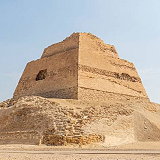
|
Maydoum Pyramid Place » Historical Place The Meidum Pyramid, located approximately 65 kilometers south of Cairo near the Faiyum region, is a significant archaeological site in Egypt. Believed to have been constructed during the transition from the 3rd to the 4th Dynasty, it is often attributed to Pharaoh Huni and later completed by Pharaoh Sneferu. 5 views 💖 1El Wasta, Beni Suef Governorate 2753212, Egypt |
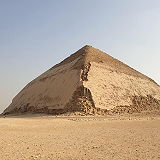
|
Bent Pyramid Place » Historical Place The Bent Pyramid is one of the pyramids built by King Sneferu, the first king of the Dynasty 4. It was called “bent” because of its broken lines due to a change of angle, an engineering issue in its design. Indeed, the pyramid construction began at an angle of 55 degrees but had to be adjusted to 43 degrees due to an overload of blocks resulting in instability. 31 views 💖 1Badrshein, Giza Governorate 3300001, Egypt |
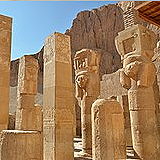
|
Mortuary Temple of Hatshepsut Place » Historical Place The Mortuary Temple of Hatshepsut is one of the most remarkable ancient monuments in Egypt, which surely you will love to visit. The temple was built to honour Queen Hatshepsut, one of the most successful pharaohs in Egyptian history. Located opposite the city of Luxor, it is considered to be a masterpiece of ancient architecture. 47 views 💖 1Al Qarna, Luxor Governorate 1340420, Egypt |
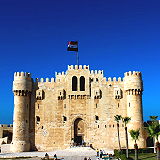
|
Qaitbay Fort Place » Historical Place Qaitbay Fort, also known as the Citadel of Qaitbay, is a historic fortress located on the Mediterranean coast in Alexandria, Egypt. Visitors to Qaitbay Fort can explore its halls, chambers, and enjoy the scenic views from its towers. The fort stands as a testament to the historical significance of Alexandria as a major Mediterranean port and the efforts to protect it through the centuries. 53 views 💖 1Alexandria Governorate, Egypt |
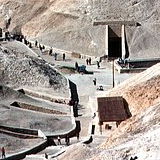
|
Valley of the Monkeys Place » Historical Place The Western Valley is an Egyptian archaeological locality situated adjacent to Luxor's Valley of the Kings and contains a number of remarkable pharaonic burials additional to the main Valley. The Western Valley is also known in Arabic as the Wadi al-Gurud (Valley of the Monkeys), on account of the representations of baboons in several tomb paintings found within the wadi. 56 views 💖 1Al Qarna Desert, Luxor Governorate 1413101, Egypt |
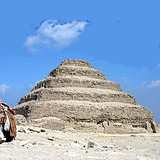
|
Saqqara Necropolis Place » Historical Place The Saqqara Necropolis is a vast ancient burial complex located in the Giza Governorate of Egypt. It is renowned for its historical significance, diverse range of tombs and structures, and the iconic Step Pyramid of Djoser. Saqqara features numerous pyramids, including the world-famous Step pyramid of Djoser,as well as a number of mastabas. Located some 30 km (19 mi) south of modern-day Cairo. 305 views 💖 1Badrshein, Giza Governorate 3352001, Egypt |
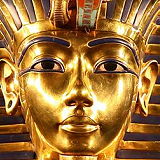
|
Tomb of Tutankhamun Place » Historical Place The Tomb of Tutankhamun, also known as the "Tutankhamun's Burial Chamber," is one of the most famous archaeological discoveries in history. It is located in the Valley of the Kings on the west bank of the Nile River near Luxor, Egypt. 58 views 💖 1Kings Valley Rd, Luxor Governorate 1340420, Egypt |
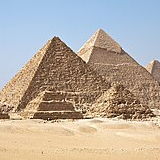
|
Egypt Place » City Egypt is a country located in North Africa, with its capital in Cairo. It is bordered by the Mediterranean Sea to the north, Libya to the west, Sudan to the south, and Israel and the Gaza Strip to the northeast. At approximately 100 million inhabitants, Egypt is the 14th-most populated country in the world, and the third-most populated in Africa, behind Nigeria and Ethiopia. 79 views 💖 1Egypt |
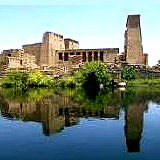
|
Philae Temple Complex Place » Historical Place The Philae Temple Complex is an ancient Egyptian temple complex located on Philae Island in the Nile River near Aswan, Egypt. It is renowned for its well-preserved temples and structures dedicated to various deities. 318 views 💖 1Aswan, Aswan Governorate, Egypt |
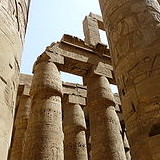
|
Karnak Place » Historical Place Karnak is a vast ancient temple complex located near Luxor in the Luxor Governorate of Egypt. It is one of the most significant and well-preserved temple complexes in Egypt, and it played a central role in ancient Egyptian religious practices and architecture. 327 views 💖 1El-Karnak, Luxor, Luxor Governorate, Egypt |
